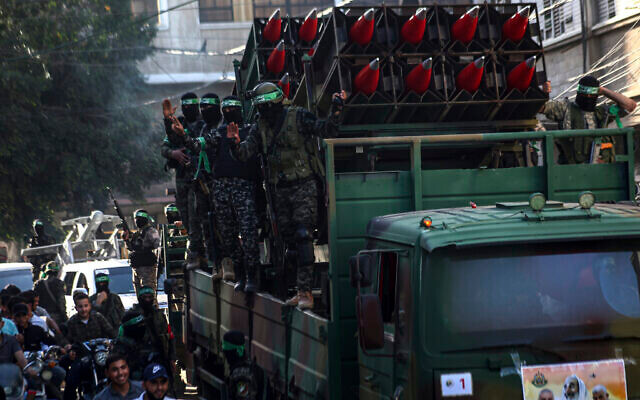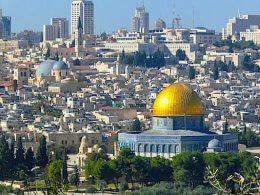An Israeli airstrike in the Gaza Strip on Saturday has significantly set back the Hamas terror group’s weapon production capabilities, military officials said.
The major strike against the Hamas underground facility came in response to rockets launched from the coastal enclave at southern Israel, which caused no injuries or damage.
The Israel Defense Forces said Saturday that the targeted facility was “one of the largest and most important sites in the Strip for the production of base materials for rockets by terror groups,” asserting that the attack would significantly impede the terror group’s rocket-making.
On Sunday, speaking to the Ynet news site, military spokesperson Ran Kochav said the underground site was also used to manufacture drones.
“In this specific case, [the IDF struck] 16 tons of explosives in an underground UAV production hall and facility,” Kochav said.
Without citing a source, Channel 12 news claimed that the missiles used in the strike were GBU-28 bunker buster bombs. The laser-guided weapon, with a payload of 286 kilograms (630 pounds), has the ability to penetrate fortified bunkers deep underground.
The GBU-28 was secretly sold to Israel in 2009, and has since been used in Gaza, mostly against Hamas’s tunnel systems.
In response to additional rocket fire on Saturday, the military struck another Hamas site, which it said was used as an weapon production facility.
Kochav added that it was important for the IDF to block Hamas’s rocket capabilities, rather than to strike the terror group’s observation posts, which are situated along the border with Israel.
“There’s 20 or 30 of these posts along the Strip, and each time there’s a new post… it’s more important to significantly strike Hamas’s rockets, rather than observation posts, which are definitely intrusive, but do not have any military impact,” he said.
With the Gaza Strip under a strict blockade by both Israel and Egypt for more than 15 years, much of Hamas’s arsenal is locally manufactured, often with parts and materials smuggled in.
A Channel 12 report said the site was specifically used to convert so-called dual-purpose materials, such as agricultural fertilizers, into explosives and fuel for rockets.
The report added that a decision to carry out the strikes on the major facility was made knowing that the price could be significant escalation, with the rocket attacks seen as an opportunity to take the facility out of action.
Still, Kochav said the military estimated that the attack would not lead to an escalation and Hamas has indicated that it is not interested in further inflaming the situation.
“We don’t know for sure who fired, but we know who didn’t fire, and Hamas is quick to say it was not behind the rockets on Saturday… it’s deterred,” Kochav said.
“This specific event is behind us. I hope we will have a quiet summer, but the IDF’s role is to prepare and be prepared for defense, attack, and intelligence, and not just in Gaza,” he added.
The rocket fire came hours after US President Joe Biden departed the country, and shortly after he announced an agreement that included steps by Riyadh benefiting Israel.
The deal will see the transfer of a pair of Red Sea islands from Egypt to Saudi Arabia — with Israeli approval — and Riyadh allowing Israeli airlines to fly over its territory on their way to the Far East. It is also expected to include the Saudis allowing direct charter flights from Israel for Muslim pilgrims.
In 2020, the Gaza-ruling Hamas launched a salvo of 13 rockets at the south as Israel was signing peace deals with the United Arab Emirates and Bahrain.
Biden departed from Israel earlier Friday, after a two-day trip that included meetings with Israeli leaders and a visit to East Jerusalem and the West Bank.









